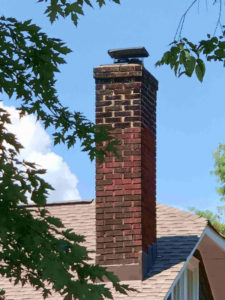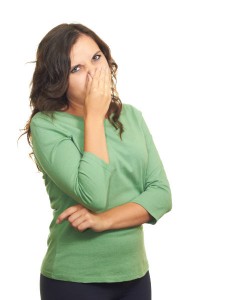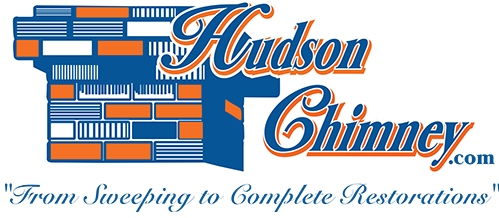by Mark Hudson | Jun 26, 2019 | Chimney Smells
There is a host of issues that a homeowner may have with their chimney throughout winter. When the fireplace is in use every day, hazards may arise anytime. However, during the off-season, chimney problems may not present immediate danger and are subtle, but they can still be quite a bother.
Perhaps you’re a homeowner in the Jacksonville, Florida area and the summer heat and humidity are affecting your chimney. You may not even realize it until you notice disgusting smells coming from your fireplace. There are lots of different kinds of odors, and each odor could mean something is wrong with your chimney. Let Hudson Chimney troubleshoot and figure out the problem with your chimney odor today!
Chimney Odors and Chimney Problems
 The first thing you might notice during the off-season won’t identify itself as a chimney problem unless you know what to look for. You may be sitting in your living room, relaxing with coffee and a friend, and then you suddenly smell the overwhelming odor of barbecue. It is strong, and now you can’t focus on anything else. This is a common complaint we get from customers as they realize that the odor is coming from their fireplace. The fireplace worked fine all year. They didn’t have any problems with it. What’s the problem? The problem, according to the professionals, depends on the odor.
The first thing you might notice during the off-season won’t identify itself as a chimney problem unless you know what to look for. You may be sitting in your living room, relaxing with coffee and a friend, and then you suddenly smell the overwhelming odor of barbecue. It is strong, and now you can’t focus on anything else. This is a common complaint we get from customers as they realize that the odor is coming from their fireplace. The fireplace worked fine all year. They didn’t have any problems with it. What’s the problem? The problem, according to the professionals, depends on the odor.
Barbecue Grill/Smoker Odor
If your fireplace smells like a dirty barbecue grill inside your living room, it is time to call the professionals. This odor is a direct result of a dirty chimney system. The soot and creosote that collects in and coats the system all winter long are beginning to stink due to the air pressure outside forcing the odors indoors. The smell also worsens when humidity rises, water vapors mingling with the soot and creosote. This combination is especially corrosive to the liner if it isn’t cleaned out of the system or the chimney is closed from the outside.
Mold/Mildew Odor
You might be smelling odors that indicate mold or mildew. If you have checked all the cabinets under the sink, looked over ceilings and walls for leaks, and caught up on laundry baskets, it’s time to look at the chimney. Water in the chimney system, especially water that has been present long enough for bacteria growth, will begin to emit these odors. This is a sign of a leak that is serious and should be fixed right away before more damage occurs.
Foul/Decomposition Odor
This type of odor is easy to identify, but homeowners never want to believe it. When you smell the foul odor of decomposition, you might assume you have a dead mouse under a bed or inside a wall. The chimney can emit this odor too. However, when animals come into the system and die when organic material begins to decompose such as limbs, wood, leaves, etc. and the odor is the same. When you smell this foul odor from the fireplace, it needs to be cleaned out immediately.
Solution
Schedule services with Hudson chimney so that your chimney smells fresh and is ready for burning season in the fall. We can clean the system from top to bottom, check for chimney leaks, and even waterproof the masonry to prevent future leaks.
Don’t settle for a stinky house or a dirty chimney. Call Hudson Chimney today at 904-282-4159 and we’ll make sure your chimney is clean and fresh in no time!
by Mark Hudson | Jun 27, 2014 | chimney maintenance, fireplaces

Can’t bear that unpleasant odor coming from your fireplace? It’s time for an inspection and thorough cleaning. Schedule an appointment today.
If your home has the strong, musty, smoky smell of an old cabin in the woods—but that’s not exactly the effect you were going for—and the origin of the smell seems to be your chimney and/or fireplace or stove, there is hope.
Being the owner of a well-loved and often-used fireplace does not mean you have to live with that overpowering fireplace odor. A trained chimney sweep will be able to suss out the cause of the smell and plot an effective plan for removal.
Why Does My Fireplace Smell?
Even though odors don’t usually vary much from fireplace to fireplace—hence most people know exactly what we mean when we say “that campfire smell”—this smell can actually be caused by a number of factors. The important thing to focus on isn’t why your chimney smells smoky; it smells smoky because it has likely accumulated soot and creosote from the fires you burn. Instead, you should focus on why this smoky odor is being dragged into your house. Ordinarily there is a problem with proper venting or with air pressure—both issues that can easily be addressed.
If you live in or around the Jacksonville, Florida, area—where we have worked for more than 30 years—one of Hudson Chimney’s certified chimney technicians will be able to determine the origin of your chimney’s odor. In the meantime, here are a few possible culprits:
- Dead animals or animal infestations are in your chimney; once the animals are removed, this problem can be easily remedied by adding a chimney cap or top-sealing damper to prevent animals from entering in the future.
- A clothes dryer, bathroom vent fan, or another appliance is exhausting air outside your home, and as a result negative air pressure is drawing outside air into your home through your chimney.
- If you have two or more chimneys, they may be competing for air pressure. This is known as “smoke crossover,” and occurs when a fire is exhausting from one chimney, causing the other chimney to draw in air and drag smoke in along with it.
How Do I Deodorize My Chimney?
If it’s been a long while since your chimney was professionally inspected and cleaned, those of us at Hudson Chimney will probably recommend that you start there. It’s kind of like having a physical if you haven’t been to the doctor in a long while. A thorough chimney and fireplace cleaning and sweeping will see to it that excess creosote and combustion byproducts—all of which are strong-smelling—are removed along with any animal nests or blockages.
If there is a backdrafting issue, no thanks to the recent addition of a range hood or energy efficient-windows, for example, your chimney technician will be able to recommend ways to allow your house to “breathe.” Beyond that, there are many proven methods for deodorizing and preventing chimney odors.
Have questions about chimney odors? Call Hudson Chimney today.
by Mark Hudson | Dec 23, 2013 | chimney maintenance, fire safety, fireplaces
Say Goodbye to Your Chimney Blockages
Is your home’s safety one of your top priorities? Do you want to save yourself from spending thousands of unnecessary dollars on expensive repairs from damages you could have prevented? Well, we’ve got the answers that you’re looking for!
Since it’s the Holiday season, you are busy preparing your house for the coming festivities. This is also most likely the only time of the year when you get to check how your chimney is doing. Most of the problems of homeowners have something to do with chimney blockages. Here at Hudson Chimney the safety and well-being of our clients always come first, we want to give you a few trade secrets on identifying the culprits of these very common chimney blockages.

Has your fireplace started pouring smoke into your living room? You may have a blockage.
Creosote
You have probably heard this being mentioned in TV commercials and promotional ads. Creosote is basically the Diva and superstar amongst all the common chimney blockers. If you don’t know what it is, it’s a particular by-product of burning wood on your chimneys. It builds up on the sides of your flue system. If left unnoticed, Creosote may accumulate and this can definitely lead to flue (or house) fires. It is highly flammable.
Debris
Things such as trash, tree foliage, leaves and other debris both natural and otherwise are also one of the most common causes of blockage. You would be surprised what we find stuck on people’s chimneys during regular inspections. Most homeowners are barely aware of what gets stuck up their chimneys. But without a chimney cap, the wind can deposit lots of debris into your chimney.
Animals
Small birds, raccoons, squirrels and animals and bugs are also one of the famous chimney blockers out there. Not only do they cause problems due to that blockage, but most of these animals (those unable to get out) create a nasty and putrid smell that can enter and spread to your homes.
What we can advise everyone to do to save more money and prevent further damage from happening is to get your chimneys inspected and swept often. You can also opt to get a chase cover or a chimney cap. Hudson Chimney is well updated with the technology that would ensure your safety and would help you from spending too much. So don’t wait until your chimney gets clogged, give us a call now and we’ll gladly help you out!
 The first thing you might notice during the off-season won’t identify itself as a chimney problem unless you know what to look for. You may be sitting in your living room, relaxing with coffee and a friend, and then you suddenly smell the overwhelming odor of barbecue. It is strong, and now you can’t focus on anything else. This is a common complaint we get from customers as they realize that the odor is coming from their fireplace. The fireplace worked fine all year. They didn’t have any problems with it. What’s the problem? The problem, according to the professionals, depends on the odor.
The first thing you might notice during the off-season won’t identify itself as a chimney problem unless you know what to look for. You may be sitting in your living room, relaxing with coffee and a friend, and then you suddenly smell the overwhelming odor of barbecue. It is strong, and now you can’t focus on anything else. This is a common complaint we get from customers as they realize that the odor is coming from their fireplace. The fireplace worked fine all year. They didn’t have any problems with it. What’s the problem? The problem, according to the professionals, depends on the odor.

